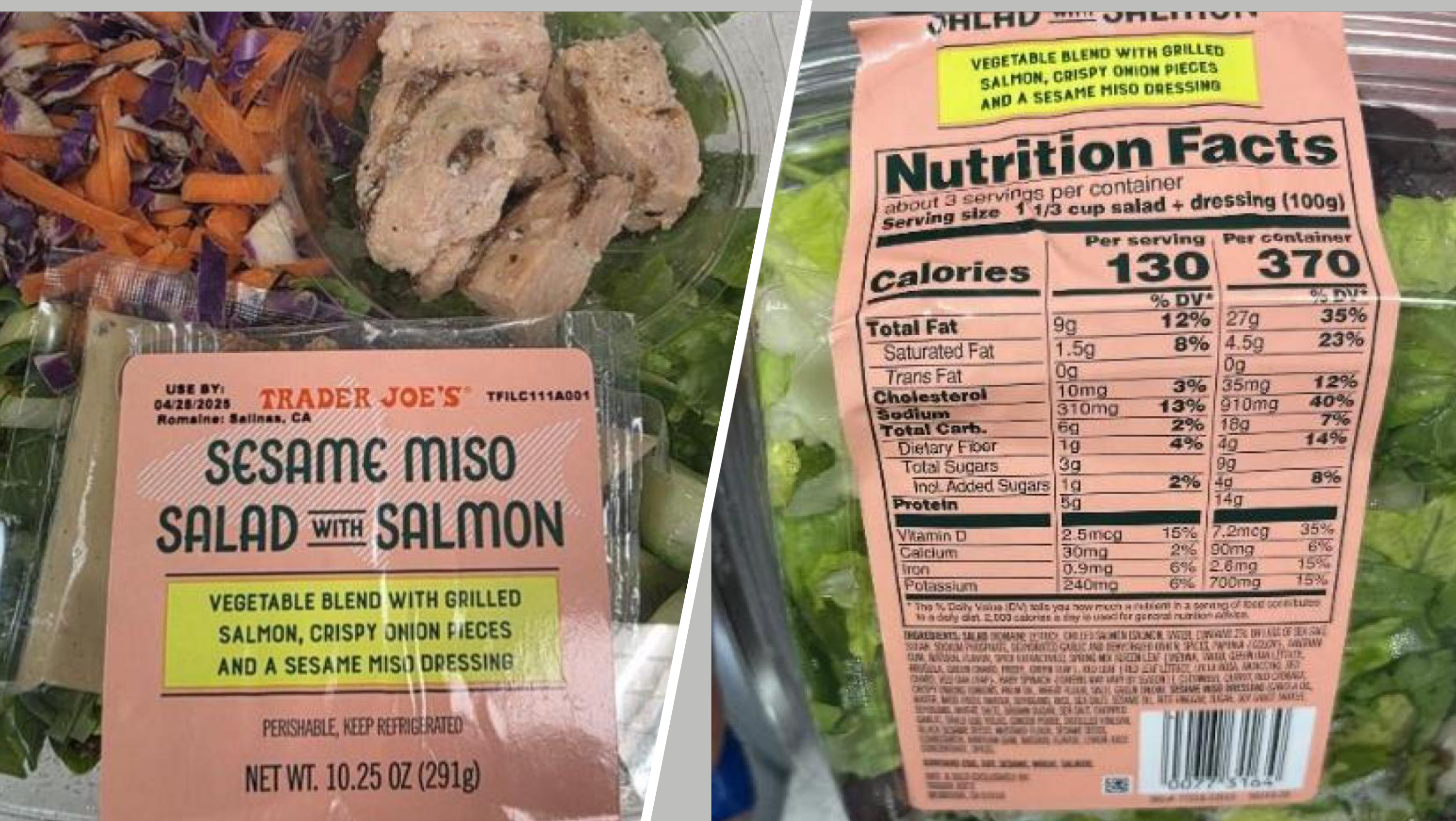Trader Joe's Salad Recall: Undeclared Allergen Alert!
Trader Joe's Salad Recall: Milk Allergen Scare!
Uh Oh! Trader Joe's Recalls Salad Over Undeclared Allergen
Ever get that sinking feeling when you realize something you've eaten isn't quite right? Well, that's exactly what happened with a recent voluntary recall issued by Trader Joe's. The U.S. Food and Drug Administration (FDA) has announced that a batch of their prepackaged salad has been pulled from the shelves due to an undeclared milk allergen. Let's dive into the details of this recall and what it means for you.
The Salad in Question: Sesame Miso Salad with Salmon
The culprit in this situation is the Trader Joe's "Sesame Miso Salad with Salmon." This pre-made salad, produced by Taylor Fresh Foods Illinois, is usually a convenient and healthy lunch option. But this time around, there's a catch! The salads may contain undeclared milk, posing a risk to individuals with milk allergies or sensitivities. Think of it like this: you're expecting a refreshing swim, but you accidentally jump into ice-cold water!
What Went Wrong? The Case of the Misplaced Parmesan
So, how did this happen? According to the FDA, approximately 500 units of the salad were mistakenly packaged with a sealed packet of parmesan cheese crumbles instead of the crispy onions that are usually included. Imagine the confusion! It's like ordering a burger and getting a pizza topping instead. This seemingly small error has big implications for those with milk allergies.
Who is Affected by the Recall? Milk Allergy Sufferers Beware!
If you have a milk allergy or sensitivity, this recall is particularly important for you. Consuming the salad with the undeclared parmesan cheese could lead to an adverse reaction. Symptoms of a milk allergy can range from mild discomfort to severe and potentially life-threatening conditions. It's like playing Russian roulette with your health, and nobody wants that!
No Reported Reactions… Yet!
The good news is that, as of the recall announcement, there have been no reported reactions to the product. However, it's crucial to be proactive and avoid consuming the recalled salad if you have a milk allergy. Think of it as being cautious and avoiding a potential disaster. It's better to be safe than sorry!
Checking Your Fridge: Identifying the Recalled Salad
How can you tell if you have the recalled salad? Check the label carefully. Look for the "Sesame Miso Salad with Salmon" product and inspect the ingredients. If you find a sealed packet of parmesan cheese crumbles instead of crispy onions, it's part of the recall. Don't take any chances – return it to Trader Joe's for a full refund. It's like a detective game, but with food!
What To Do If You Have the Recalled Salad: Options and Next Steps
So, you've identified the recalled salad in your fridge. What now? You have a few options:
- Return it to Trader Joe's: The easiest and safest option is to return the salad to any Trader Joe's location for a full refund.
- Discard the salad: If you're unable to return it, dispose of the salad immediately to prevent accidental consumption.
- Contact your doctor: If you consumed the salad and have any concerns about a potential allergic reaction, consult your doctor.
Understanding Milk Allergies: More Than Just Discomfort
Symptoms of a Milk Allergy
A milk allergy can manifest in various ways, ranging from mild skin reactions to severe anaphylaxis. Common symptoms include:
- Hives or skin rash
- Itching or tingling in the mouth
- Swelling of the lips, tongue, or throat
- Wheezing or difficulty breathing
- Nausea, vomiting, or diarrhea
- Stomach cramps
- Dizziness or lightheadedness
Severe Allergic Reactions: Anaphylaxis
In severe cases, a milk allergy can trigger anaphylaxis, a life-threatening allergic reaction. Symptoms of anaphylaxis include:
- Difficulty breathing
- Swelling of the throat
- Sudden drop in blood pressure
- Loss of consciousness
If you experience any symptoms of anaphylaxis after consuming the salad, seek immediate medical attention. This is a medical emergency!
Why Recalls Happen: A Look Behind the Scenes
Food recalls are unfortunately a part of the food industry. They often happen due to mislabeling, contamination, or other safety concerns. Think of it like a safety net – recalls are put in place to prevent widespread illness or injury. While they can be inconvenient, they're essential for protecting consumers.
The Role of the FDA: Protecting Our Food Supply
The FDA plays a crucial role in monitoring the food supply and ensuring its safety. They investigate reports of foodborne illnesses, inspect food processing facilities, and issue recalls when necessary. The FDA's involvement helps to hold food manufacturers accountable and protect the public health. They're like the food police, keeping our plates safe!
Preventing Future Recalls: Lessons Learned
How can we prevent similar recalls from happening in the future? Better quality control measures, more thorough labeling practices, and improved communication between manufacturers and retailers are all essential. It's like building a fortress against future mishaps. A multi-layered approach is key.
Staying Informed: How to Track Food Recalls
Want to stay informed about food recalls and other food safety alerts? Here are some helpful resources:
- The FDA website: The FDA's website (www.fda.gov) is a comprehensive source of information on food recalls.
- USDA website: The USDA website (www.usda.gov) also lists food recalls for meat, poultry, and processed egg products.
- Food Safety News: Food Safety News (www.foodsafetynews.com) is a website that provides up-to-date information on food safety issues.
The Bigger Picture: Food Safety Awareness
This recall serves as a reminder of the importance of food safety awareness. Always read labels carefully, especially if you have allergies or sensitivities. Be aware of the potential risks associated with food products and take steps to protect yourself and your family. It's like being a responsible citizen of the food world!
Trader Joe's Response: Transparency and Responsibility
Trader Joe's has been proactive in addressing this issue and issuing the voluntary recall. Their prompt action demonstrates a commitment to transparency and responsibility. Companies that prioritize consumer safety build trust and maintain a positive reputation. It's like a handshake, promising to do right by their customers.
Conclusion: Stay Informed and Stay Safe
The Trader Joe's salad recall is a reminder that even seemingly minor errors in food production can have significant consequences. If you have the affected "Sesame Miso Salad with Salmon," return it to Trader Joe's for a refund. Remember to always read labels carefully and stay informed about food recalls. By staying vigilant, we can all help to ensure the safety of our food supply. So, stay informed, stay safe, and happy eating!
Frequently Asked Questions (FAQs)
- What specific product is being recalled? The Trader Joe's "Sesame Miso Salad with Salmon" is being recalled due to the potential presence of undeclared milk (parmesan cheese).
- Why is this salad being recalled? The salad was mistakenly packaged with a packet of parmesan cheese crumbles instead of crispy onions, leading to undeclared milk allergen.
- What should I do if I purchased the recalled salad? If you have a milk allergy, return the salad to Trader Joe's for a full refund or discard it immediately. If you consumed it and have concerns, contact your doctor.
- Are there any reported illnesses or reactions from consuming the recalled salad? As of the recall announcement, there have been no reported reactions related to consuming the product.
- Where can I find more information about food recalls and food safety? You can find more information on the FDA website (www.fda.gov), the USDA website (www.usda.gov), or on websites like Food Safety News (www.foodsafetynews.com).

